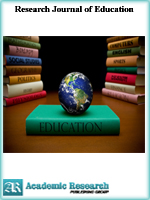Research Journal of Education
Online ISSN: 2413-0540
Print ISSN: 2413-8886
Print ISSN: 2413-8886
Quarterly Published (4 Issues Per Year)

Archives
Volume 4 Number 9 September 2018
The Effect of Perceived Organizational Support on Job Performance Among Administrative Staff of Newly-Built University in China
Authors: Peng Wan ; Khaliza Binti Saidin
Pages: 151-154
DOI: doi.org/10.32861/rje.410.151.154
Abstract
In the context of the popularization of higher education and the emergence of a large number of newly-built universities in China, it is important to improve the job performance of administrative for newly-built university effectiveness and outcomes. According to perceived organizational support (POS) theory and relevant research review, POS is considered to be a key factor in improving job performance. However, there is still some research found that POS could not affect job performance directly and researchers are less concerned about university administrative staff. Therefore, this study aimed to determine the effect of perceived organizational support on job performance among administrative staff of newly-built university in China. An online questionnaire was adopted in the study to collect data, and a total of 426 administrative staff participated in the survey. After data analysis by SPSS, the findings indicated that the level of POS and job performance among administrative staff is slightly low. The findings also revealed that a positive correlation exists between POS and job performance, and the POS has significant effect on job performance. The study further discussed the findings and recommended that more organizational support should be provided by newly-built universities in order to improve the job performance of administrative staff.
Student Mobility: Challenges and Opportunity for Unidad Profesional Interdisciplinaria De Ingeniería Campus Guanajuato (UPIIG-IPN)
Authors: Yazpik Hernandez Vargas ; Angelica Beatriz Raya Rangel ; Luis Rey Diaz Barron
Pages: 145-150
DOI: doi.org/10.32861/rje.49.145.150
Abstract
The work context and the society’s dynamism of the century XXI require - professionals who possess high qualification, skills of communication, with the handling of technological tools, the capacity of adaptation and consciousness of contribution for the social and economic development of its environment, with a vision of a globalized world. Developing these profiles marks a milestone for higher education institutions, what make them focus in the search of strategies for their graduates to achieve a successful inclusion in different professional, academic and multicultural contexts (Luchilo, 2006). Between such strategies highlights the implementation of programs of student mobility, which give place to a contemporary migratory phenomenon in response to the internationalization of the information, the knowledge and the technology (Fittipaldi et al., 2012). This article presents the results of a study conducted on the experiences of the students of the Unidad Profesional Interdisciplinaria de Ingeniería campus Guanajuato (UPIIG), belonging to the Instituto Politécnico Nacional (IPN), that have participated in calls of student mobility, analyzing the advantages, disadvantages, challenges and areas of opportunity for the institutional program.



